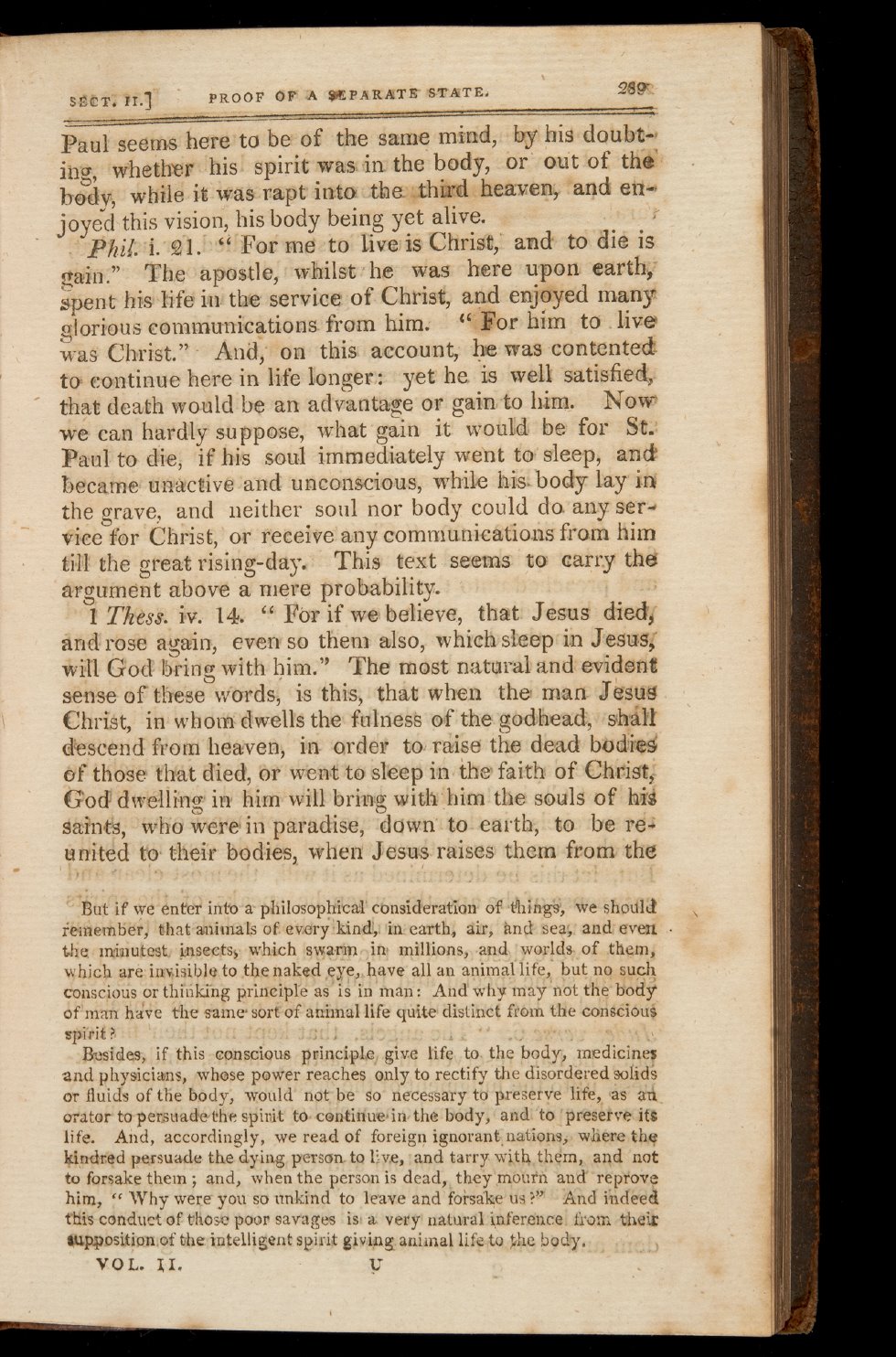

S$eT.
II.
PROOF
OF
A
KPARATE
STATE.
?99-
Paul
seems
here to
be
of
the
same mind,
by
his
doubt-
ing,
whether
his
spirit
was in
the body, or
out
of
the'
bedv,
while
it
was
rapt
into
the.
third
heaven, and
en-
joyed-this
vision, his
body being
yet
alive.
Phil:
i.
g1.
"
For
me
to
live is
Christ,'
and
to die
is
gain."
The
apostle, whilst
he was
here
upon
earth,
spent
his
life
in
the service
of
Christ,
and
enjoyed
many
glorious
communications from
him.
"
For
him
to
live
was
Christ."
And, on this
account,
he
was
contented
to
continue here
in life
longer:
yet
he
is
well
satisfied,
that
death
would
be
an advantage or gain
to him.
Now
we can
hardly
suppose, what gain
it
would
be
for
St.
Paul
to
die,
if
his soul
immediately went to
sleep,
and
became unactive
and
unconscious,
while
his.
body
lay
in
the
grave,
and
neither
soul
nor
body
could
da
any
ser-
vice
for Christ, or receive any
communications
from him
till
the
great
rising
-day.
This
text
seems
to carry
the
argument
above
a mere probability.
1
Thess.
iv. 14.
"
For if
we
believe,
that
Jesus
died,
and
rose again,
even
so
them
also,
which sleep
in
Jesus,
will
God
bring with him."
The
most
natural
and evident
sense
of
these words,
is
this,
that
when
the man
Jesus
Christ,
in whom dwells
the fulness
of
the
godhead, shall
descend
from
heaven,
in order
to raise the
dead bodies
of
those
that
died,
or went
to sleep
in
the faith of
Christ,
God
dwelling in
him
will
bring with
him
the
souls
of
his
saints,
who
were
in
paradise, down
to
earth,
to be
re
united
to
their
bodies, when
Jesus
raises them
from the
But
if
we
enter
into
a
philosophical consideration
of things,
we
shoulü
resnernber,
that
animals
of
every
kind,
in
earth,
air, and
sea',
and even
the
minutest
insects
which swarm
in
millions, and worlds
of them,
which are invisible
to
the
naked eye, have
all an
animal life, but
no
such
conscious or
thili
ing
principle
as
is in
man:
And
why may not
the body
of man
hive the same
sort of animal life
quite
distinct
from
the
conscious
spirit?
Besides,
if this
conscious
principle
give life
to.
the body,
medicines
and
physicians, whose power reaches only
to
rectify the disordered
solid's
or fluids of
the body,
would not be
so
necessary to preserve life,
as
an
orator
to
persuadethe
spirát
to.
continuein- the
body,
and
to preserve its
life. And,
accordingly,
we
read
of foreign ignorant,nations, where
the
kindred persuade the
dying,
person. to
lave,
and
tarry
with them, and not
to
forsake
them
;
and,
when
the
person
is
dead,_
they
mourn and
reprove
him,
"
why
were you
so
unkind
to
leave and
forsake
us
?"
And
indeed
this conduct of those poor savages
is
a
very natural inference
from
their
sup.position:of
the
intelligent spirit giving animal
life
to
the body.
VOL.
II.
ti

















